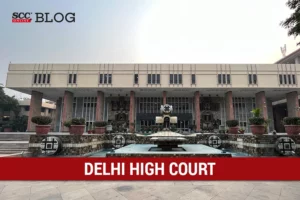Delhi High Court: In a writ petition filed under Article 226 of Constitution of India by a practicing radiologist challenging order dated 20-03-2010 issued by the Ethics Committee of Medical Council of India (‘MCI’) directing temporary removal of the petitioner’s name from the Indian Medical Register, C. Hari Shankar, J. set aside the said order since the doctor was never given a chance to plead against falsification of record but medical negligence, which the petitioner had already been discharged of by MCI.
Facts of the Matter
The instant matter relates to a 21-year-old patient who reported to the gynecologist at Krishna Medical Centre (‘KMC’) on 12-05-2007 with a complaint of intermittent vaginal bleeding. She was diagnosed as a case of inevitable abortion with bleeding and scheduled for further process on the same day. In the afternoon, the petitioner got a call that a patient urgently required his ultrasonological (‘USG’) services for removal of products of conception (‘POC’) and blood clots products of conception (‘POC’) and blood clots. The surgical part of the process was performed by the gynecologist at KMC, while the petitioner provided the necessary USG assistance. The petitioner left after satisfying himself that no blood clots or POC remained, which may otherwise develop life-threatening infection. The patient died on the same day declared as brought dead after being shifted to Safdarjung Hospital.
It was alleged by her family members that the patient died because of medical negligence at KMC. The police authorities sought the opinion of Delhi Medical Council (‘DMC’) which attributed negligence to the petitioner as well. The petitioner cleared his stand before the police as well as the DMC. The gynecologist at KMC allegedly fabricated records to indicate that the petitioner himself conducted the USG procedure twice.
The Court perused the medical record as noted by the gynecologist at KMC and the petitioner had signed the noting only once for the USG examination so conducted. The discharge slip also reflected satisfactory progress of the patient. However, later that day, the patient was still there in the corridor of KMC, fainted, looking critical due to labored breathing. She was declared dead and her husband in panic took her to Safdarjung Hospital, wherein, the postmortem report recorded the cause of death as “haemorrhagic shock, consequent upon perforation of the uterus, following surgical intervention”.
The DMC order dated 4-02-2008 held all three attending Doctors liable for medical negligence. The same was challenged by the petitioner before MCI under Regulation 8.8 of Code of Ethics Regulations 2002 and the Ethics Committee of the MCI reiterated the DMC’s decision to remove the names of all three doctors from the State Medical register. The said decision was put before Executive Committee of the MCI which remitted the petitioner’s case back to the Ethics Committee for reconsideration which again kept its initial stand for removing their names for a period of 3 months, and the said decision was approved by the Executive Committee of MCI. The same was challenged through the extraordinary jurisdiction of High Court under Article 226 of Constitution of India. The operation of the said order was stayed by the High Court when notice was issued in the instant matter.
Court’s Analysis
The Court pointed out that the petitioner was never charged with falsification of records prior to the impugned order passed by MCI, and that it was always a case of medical negligence which contributed to the patient’s death. The allegation of medical negligence was categorically found by the MCI without any substance. The Court reiterated the principal of audi alteram partem through Mohinder Singh Gill v. Chief Election Commr., (1978) 1 SCC 405 while holding that the petitioner was not given a chance to explain himself on falsification of records, which was not even specified/explained in the impugned order.
The Court expressed that “Falsification of records is an extremely serious matter. It partakes of crime and is colored by criminal intent. Where the falsification takes place in connection with treatment of a patient, especially where the patient is dead, the seriousness of the misdemeanor increases manifold.” The Court said that the order must be precise enough to contend falsification of record and the doctor must be put on notice before arriving at such finding.
The Court unhappily observed that “having found that no allegation of medical negligence could sustain against the petitioner, the MCI confirmed, against him, the allegation of falsification of records, which was never even raised against him in the first place, merely so as to justify imposition of punishment on the petitioner.” The Court commented that striking off the name of a doctor from Indian Medical Register partakes the character of a civil death as far as the professional career is concerned, whose familial and societal ramifications are far reaching. It further said that baseless targeting of doctors seriously prejudices public interest.
The Court set aside the order passed by MCI on 20-03-2010 while holding that the said order failed to justify falsification of records, or the punishment awarded.
[Dr Pramod Batra v. Medical Council of India, 2023 SCC OnLine Del 3759, decided on 3-07-2023]
Judgment by: Justice C. Hari Shankar
Advocates who appeared in this case :
For Petitioner: Senior Advocate Siddharth Aggarwal, Advocate Vishwajeet Singh, Advocate Rudrali Patil;
For Respondents: Advocate T. Singhdev, Advocate Bhanu Gulati, Advocate Michelle B. Das, Advocate Abhijit Chakravarty, Advocate Raman Preet Kaur.

